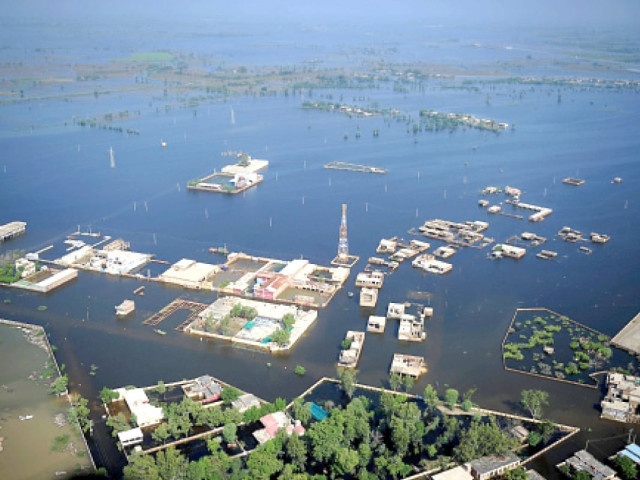Pakistan has yet to learn how to deal with natural calamities, say experts
People living in rural areas, particularly women and children, are worst hit.

Pakistan has yet to learn how to deal with natural calamities, say experts
Though massive floods have swept through the country in three consecutive years, environmentalists feel that the government has not taken them as a cue to better prepare themselves for the next time disaster strikes.
At a seminar on climate change held on Saturday at the Karachi Press Club, experts said that the government has turned a blind eye to the fact that Pakistan is losing billions of dollars because of its changing ecology. The event had been jointly organised by the Pakistan Fisherfolk Forum (PFF), Pakistan Institute of Labour Education Research (PILER) and National Council of Environmental Journalists (NCEJ).
PFF’s Saeed Baloch said that developed countries had adapted themselves to better cope with the challenges hurled their way by climate change. “But we do not take serious efforts to adapt or involve the affected communities. We are still observing the situation and have yet to approve a draft on the climate change policy.”
NCEJ’s president, Amar Guriro, said Pakistan loses $365 billion each year because of changing ecology. Despite this, the country does not have a solid policy to mitigate the effects of natural calamities.
Majeed Motani, a community elder from Ibrahim Hydri, said, “Because of the government’s apathy, marine pollution is increasing and affecting the livelihood of fishermen. There are no more fish along the beaches.”
Zulfiqar Shah, the joint director of PILER, said Sindh was more vulnerable to disasters. “Around 50 million people live in the province, out of which 30 million people live in rural areas which are more vulnerable to disasters.”
He said that poor people were bearing the brunt of the effects of changing rain patterns. “Most people don’t have their own piece of land. Small farmers and fishermen are very vulnerable.”
Shah said three million fishermen earn an income from marine and inland waters. “Similarly, most rural communities depend on crops, but they are facing food insecurity because of infertile soil.” he added. “Among the rural people, women and children are hit worst by climate change.”
Nadia Bajwa, who manages World Wide Fund for Nature Pakistan’s climate change adaptation programme, is working on over 1,050 kilometres of the coastal belt. Her team is conducting vulnerability assessments of coastal communities.
“We are trying to get scientific and sociological feedback from various sources, including indigenous people. We are also working on trans-boundary issues related to Pakistan and India,” she added.
Sharing findings of the study, she said they have designed a strategy to initiate community level adaptation in two union councils of Thatta. “We are learning from community experiences regarding visible changes related to climate.” She said Pakistan has been ranked number 16 on the Maple Croft’s Climate Change Vulnerability Index.
“We know the community depends on natural resources. But we are working to change their dependency and introducing alternative sources of livelihoods.”
Correction: An earlier version of the article had miquoted Nadia Bajwa as saying "Pakistan is in number 16 on world index of the impacts of climate change," when in fact she said, "Pakistan has been ranked number 16 on the Maple Croft’s Climate Change Vulnerability Index." The error is regretted.
Published in The Express Tribune, November 18th, 2012.



















COMMENTS
Comments are moderated and generally will be posted if they are on-topic and not abusive.
For more information, please see our Comments FAQ